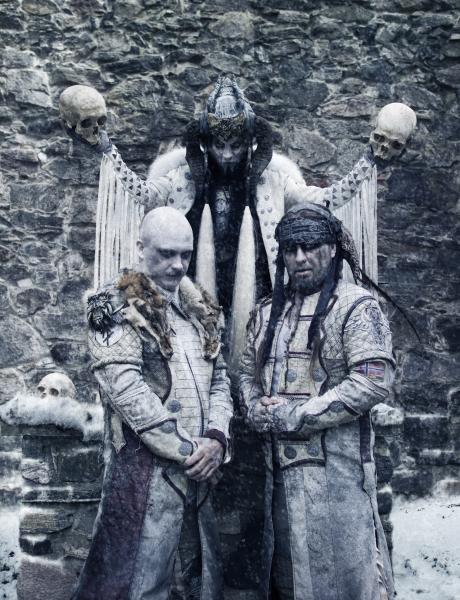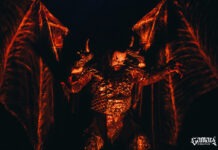DIMMU BORGIR is by far the most successful band to ever emerge from the Norwegian black metal scene. Last year, they fired their keyboardist Mustis and bassist ICS Vortex and returned in 2010 with a new line up, a new unconventional image, and an absolutely enthralling album, “Abrahadabra,” thus diverging from the traditional three-word album title formula ever since the 1996 release “Stormblåst.” DIMMU BORGIR has pushed the envelope once again, departing even further from the established black metal template. This departure has sent all the self-proclaimed black metal purists – who have long ago written the band off for such unthinkable crimes as having a record deal and growing album sales – into an instant state of frenzy. However, DIMMU’s loyal fanbase is expanding steadily regardless of those opinions. That is the natural sequence of things, when the band continuously raises the bar by producing high-quality records that bear distinctive and outstanding sound. To support the new album, DIMMU BORGIR embarked on the Darkness Reborn 2010 Tour, firing on all cylinders. We met the band’s vocalist, Shagrath, to talk about this new era.

You have opened a new page in the band’s history after ICS Vortex and Mustis were fired. Was this something that absolutely had to be done in order for the band to go through all of the recent innovations?
Based on the fact that there were a lot of changes through the last year in the band, and we are a band that always wants to take things into new directions anyway, we would have done that with those people or not. It’s a decision we have been thinking about before for a long time. We were all about evolving into new directions. We’re never afraid of trying out new stuff; wearing [white] is very different from the regular bands in the same genre. But we stick out anyway. We’re not merely a black metal band; we’re so much more than that. We take the freedom to express ourselves exactly the way we want to, without any other people’s approval.
Nobody has made white look so evil before.
That’s how we work [on] each record. We don’t want to stagnate, repeat ourselves too much. We did one concept album for the previous record related to a certain story and a certain look and now we evolve, you know? Time changes. We do something new musically and visually and that’s very important for us as musicians, to develop into new directions. Even though I respect bands who stick to the same thing no matter what, for us it’s important to evolve.
How would you describe DIMMU BORGIR nowadays and what would be the message you want to deliver?
It’s not like we try to preach to people. It’s basically about the atmosphere we want to give, the certain type of feeling by listening to the music. It’s almost like time-travel. People have different opinions on how to take things inwards, how they discover the music. For some people, a certain part in a song could be “oh this is very beautiful” while another person can say “oh this is really depressing.” It’s up to each one to decide how they want to perceive the music. But I would say the atmosphere is the main focus of the band.
Speaking of atmosphere: DIMMU BORGIR is not just about music, it’s also about all those theatrics and visual images.
We originally come from the black metal genre and also the music we have grown up listening to – which is very much ’80s heavy metal bands that had a very strong image – and that’s how it should be, we think. I mean, the music itself stands on its own feet, but to give people something that kind of relates to the music is very important. And visual aspects always go hand-in-hand with the music. I grew up listening to bands like KISS and if I go to a concert and see a band, I want to see a show. If it’s just about listening to the music, then I’ll just stay at home and listen to the record. So yeah, the visual aspects are extremely important.
So was the new white image mostly your idea?
Yeah, it was my idea in the beginning, but it kind of developed into a certain direction. Based on the fact that we are Norwegians, we also wanted to capture some of the aspects of the so-called Nordic “caveman” type of look, to keep that within the music; I think it’s important. So it’s done in an extreme way. Nobody pays any attention to black anymore, because everybody wears the same shit: the same spikes, the same bullet belts, the same makeup. We’ve been around for over 17 years and it’s always good to make changes. When I presented the ideas [to] the people, they were not [much] into it at first, so we had to make the first costumes and that was shown to everybody. Then they said “Yes! That’s the way we’re gonna do it”. Maybe for the next album we’re gonna do something completely different again, there are no limits.
One of the guest singers on “Abrahadabra” is Agnete Kjølsrud from a band called DJERV. Tell us more about this collaboration.
I’m a very big fan of her previous band, ANIMAL ALPHA. Agnete is also a good friend of mine, we met out in the city. I’ve been talking to her a lot and I also like her new band, DJERV. So I asked her if she wanted to become a part of one song on the album and she said yes, ‘cause she is also a fan of DIMMU BORGIR. So she came to the studio, we nailed it in a couple of hours, it was done.
Would you collaborate with DJERV as a guest vocalist if they asked you, as it’s not black metal?
No, I don’t think so, probably not. I like their music, of course. But I get a lot of offers all the time to do guest things and just don’t have the time to do that either. It’s too much for me to handle. I have three bands, so it’s a lot to do.
You took the new album’s name from Aleister Crowley’s work. What, in your opinion, makes his philosophy and his works so attractive to black metal bands?
It’s a little bit misunderstood, in the fact that for me “Abrahadabra” represents maybe something different than to the other people in the band. We probably don’t share the same opinion about the title. But for me this title represents the changes of the band. It is directly translated as “create as I speak.” Aleister Crowley was a lot into reincarnation and rebirth, which is very much related to what we have gone through [over] the last year. Therefore it’s not purely a concept album, but it deals with different types of subjects also regarding the strength and unity of DIMMU BORGIR. It’s not like we’re following Crowley specifically, but he has a lot of interesting things related to him. And Silenoz is probably the one who is more into the occult than I am.
It was announced in the news that Snowy Shaw from THERION joined Dimmu Borgir and then one day later he left the band. Did he just drop by to pick up some good ideas from you or what?
Don’t trust the news [laughs]. A lot of people ask questions like that. We have never made an official statement that we have any new members in the band. We are three members in DIMMU BORGIR and the other people are just hired to do a job, which was also the case with him. We hired him to play bass on the record. That’s it. There’s no story behind anything, he’s never been a member of DIMMU BORGIR, he was paid to play on the record. That’s it, simple and easy. [If you just listen to people], that’s how one feather becomes three chickens.
You used to write lyrics for DIMMU BORGIR in Norwegian in the past, and recently some of the old stuff you wrote was also used for OV HELL. Do you ever think about doing this with DIMMU BORGIR again?
We have such a big fanbase throughout the world, it’s good to just stick to the English language so that more people [would be] able to understand what we preach about. But once in a while we throw in a Norwegian song; we might do this in the future also. Also the drama is very linked to the so-called Norwegian scene. It just felt natural to have English lyrics on the latest record.
With the whole idea and image of DIMMU BORGIR, you have probably been banned from some places. What would be the stupidest ban ever that you had to face?
We were denied access to Poland. We couldn’t enter the country for a couple of years because there was some guy who killed somebody and he had a DIMMU poster on his wall. But recently we have been there again, so it’s all fine.
Do you personally take care of the promotion, merchandise, and business side of the band, or is that just the label?
It’s a combination. Most of the ideas come from me and Silenoz – we do a lot of the business side of the band. Business sucks, but it has to be done when you’re a band on the level we are on right now. It’s very important to do things correctly. So there is a lot of business involved, but we try to split it between us. And of course we have big management and a very good record company as well. So it’s basically ideas from that type of circle.
What do you think is the state of the black metal scene worldwide these days? Apparently it’s thriving in Norway, but it doesn’t seem to be that successful outside of northern Europe.
Yeah, I still think it will survive because the genre is very independent. It’s about expression; it’s not about figures or numbers or business. It’s more about feelings, so it will survive of course. I don’t listen to many black metal bands from [around the world], so I can’t really say. I mean, there are a few good bands here and there, but in general most black metal bands come from Norway, which represents quality and uniqueness. I don’t know why it is like that, but we have the best black metal bands in the world.
These days a lot of people say that black metal is not so dark anymore, there’s not as much Satanism and anger in it.
I don’t agree with that at all. I think the genre has been much more acceptable among people and the magic is gone; from what happened in the early ’90s with all the criminal acts and things that happened back at that time. Everything became world-known, so to say, and the magic is gone, but not within ourselves. I guess a lot of people don’t take it seriously, but there are a lot of serious bands out there still.
You have probably heard a lot of black metal fans say that DIMMU BORGIR had sold out and became just another commercial band. What would be your answer to these people?
I would just say, “Fuck off!” They don’t have any idea what they’re speaking about. First of all, we are very hard-working people, we are very much dedicated to what we do, and you can see the result of that. All those whining bitches, who shout “oh fucking sellouts,” all those bands who do that, for how long are they out [there]? One or two years and then they disappear, fade out. We’ve been in this business now for over 17 years and more. And nobody can come and tell me that we sold out or whatever. What’s fucking wrong with selling records? That’s based on the work you do. It’s just a bunch of bullshit and I don’t think they know what they’re talking about. It just doesn’t make any sense; there are so many stupid people out there.
Perhaps they are those people who still remember tape-trade and stuff…
Yeah, I used to be there myself. But if you just keep repeating, playing the same old shit all over again, what’s the point? For us it’s all about evolving into new territories and we’ve never been afraid of stretching our boundaries and doing new things. Nobody can tell us what to do.
Interview by Tanja Caciur
Musicalypse, 2010
OV: 1620+
Links
Recent posts
[recent_post_carousel design=”design-1″]
Related posts
News post





